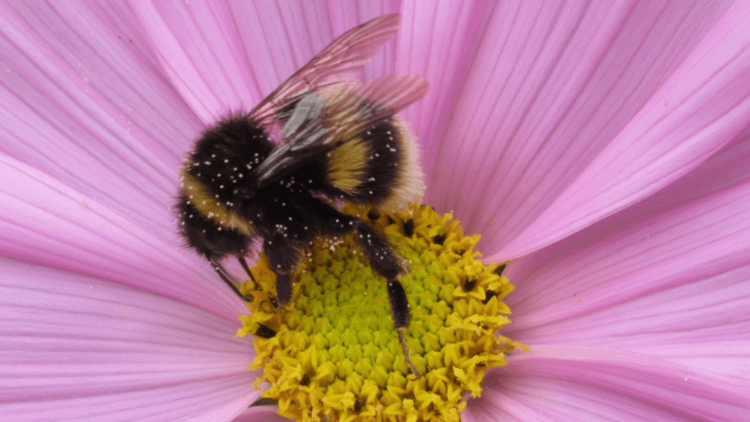5 ways to help save the bees this World Bee Day and bee-yond!
Today at V-Land we’re celebrating World Bee Day, a day dedicated to the often overlooked little creatures that play a huge role in keeping the earth a habitable place to live. Our beloved bees contribute vastly towards the pollination of nearly three quarters of plant species, helping to produce a whopping ninety percent of the world’s food supply, ensuring not only our survival, but the health and diversity of ecosystems on our planet too.
Why do we need to help bees?
Without the hard work of bees, and other important pollinators, the future of our planet remaining habitable for humans and animals is at serious risk. Bees face huge difficulties in maintaining their population due to mass habitat loss caused by human activity; from agricultural intensification, loss of land to urbanised areas, increased use of agro-chemicals such as neonicotinoid pesticides, and the increasingly detrimental effects of climate change, leading to a global pollination crisis.
In the UK alone, eleven bee species have become extinct over the past century, with a further thirty-five added to the endangered species list. Recently the EU agreed to ban neonicotinoids; a pesticide that works by disrupting insects’ nervous systems, but, unfortunately, since Brexit, that agreement was retracted with the UK Government announcing that it will reintroduce the use of the banned pesticide thiamethoxam on sugar beet in England. Environmental organisations RSPB, Friends of the Earth, Buglife, The Wildlife Trusts and PAN UK state the decision goes against the government’s green promises, and will ultimately lead to the harm of wildlife. With farmland covering a colossal seventy five percent of the UK, banning pesticides is vital in the fight to reverse nature’s decline, which many organisations are currently campaigning towards.
But how can we help bees?
Campaigning to end the use of agro-chemicals is an essential part of protecting the rapidly declining bee population, and there are multiple petitions you can sign to add your voice to the growing resistance to pesticide usage, but what else can we do to help our fuzzy-bottomed friends?
Here are V-Land’s top five ways to help bees: we hope you’ll join us in trying to enact them.
Participate in No Mow May
The loss of habitat is the most pressing problem facing British bees: ninety-seven percent of British wildflower meadows and grasslands have been lost in the past sixty years. The simple act of refraining from cutting our grass allows local wildflowers the chance to bloom, and feed our struggling pollinators. This not only helps bees but all sorts of native wildlife from butterflies, to birds, and insects galore. Read more about No Mow May in last week’s article, and if you succeed in the month-long challenge, consider leaving your green space to remain wild and forever-free.
Support rewilding projects
Rewilding is the act of letting nature be, to enable wildlife to grow freely once more, with minimal human interference. The Vegan Land Movement CIC aims to buy land proposed for animal agricultural use, to give back to the earth, whilst supporting vegan-friendly rewilding projects. Their most recent success was the acquisition of a plot of land in a bidding war between two chicken farmers, thankfully, due to many generous donations, the land was purchased by The Vegan Land Movement in February 2022 saving up to twenty thousand chickens per year from slaughter, and allowing the land to regrow wild and free. If you have anything spare to donate, you can do so via their Crowdfunder.
Plant wildflower
Along with letting grass grow freely, we can give bees a helping hand by planting native wildflowers that are full of pollen and nectar for peckish pollinators. Bee Bombs are a fantastic solution to the UK’s wildflower decline and can be scattered anywhere for an almost instant mini wildflower meadow in your garden or allotment. You can also visit Friends of the Earth and give a donation of your choice to receive a free Bee Saver Kit packed with interesting bee facts, including wildflower seeds, a garden planner, a bee spotter guide, step by step handbook, and a bee postcard to send to your loved ones and spread the word to help save the bees! This kit is great if you have children at home, they love to give a helping hand and get so excited when the flowers bloom and bees come buzzing into the garden.
Carry a bee revival kit
A bee revival kit is a keyring that you can carry with you, providing an emergency solution made up of two parts sugar and one part water to revive an exhausted bee. Beevive UK is our personal favourite with a relatable back story of stumbling across an exhausted bee but with no flowers in sight to help it. They rushed to a local cafe and after a few slurps of sugar water, off the bee flew! Their instagram is filled with customers sharing their bee saving antics and we never leave home without a trustee bee saver keyring to hand. These also make great gifts and were shortlisted for Gift of the Year 2021.
Tell your tribe!
When people see friends or family trying to do something good for nature and their local community, it often has a knock-on effect. If you’re trying to do your bit to help bees, tell your tribe about it, whether it’s your loved ones over dinner, colleagues at work, or a social media post to all your friends and followers; sharing the ways you’re trying to help the bees will encourage others to do the same.
Together, we can make a difference and help save the bees, this World Bee Day and bee-yond!
